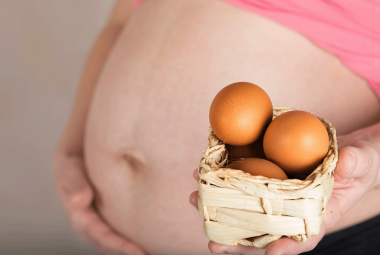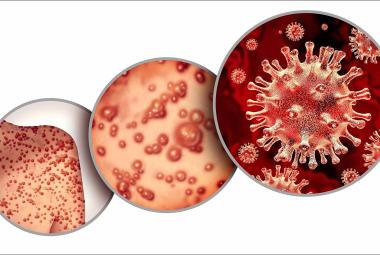Introduction
It seems there is always a new diet that becomes “trendy” or popular in the media, many of which tout “healthier” or “clean” eating. It is important to consider that such diets may have negative effects on the pregnant mother or her developing child. However, there is limited research on how fad diets affect pregnant women or their unborn children. In fact, pregnant and breastfeeding women are often excluded from research on certain diets to avoid potential risks to mother and child. Below is a discussion of 3 current popular diets – Ketogenic, intermittent fasting, and Paleolithic – and what we know their impact or potential impacts during pregnancy.
Ketogenic Diet
The Ketogenic diet consists of a low carbohydrate and high fat diet. Primary foods included are dairy, vegetables, and lean meats. Foods that are avoided, in addition to sweets, include breads, pastas, grains, beans, and starchy vegetables. Following this diet results in ketosis, a metabolic state that burns fat as the primary source of energy rather than carbohydrates, the preferred fuel for the brain and nervous system.
It is speculated that prolonged ketosis could be concerning for mother and baby. Studies in animals have reported potentially adverse fetal effects, including changes in brain structure.1 One study in pregnant women found that carbohydrate-restricted diets may increase the risk of having a child with a neural tube defect, a serious problem affecting closure of the spinal cord.2 One reason for this may be that certain carbohydrate foods that are fortified with folic acid are not permitted on this diet. Breads, grains, and cereals are fortified with folic acid, a mandate by the FDA since 1998.2 Studies have found that even in cases of folic acid supplementation, women who severely restrict carbohydrates still do not meet folic acid needs.2 Interestingly, one study found that even prior to folic acid fortification (1998) low carbohydrate diets during pregnancy were associated with risk of neural tube defects, indicating that other nutrients or nutrient synergies may be involved.3 Regardless of diet, women are encouraged to take folic acid supplements one month before and at least the first 2 months of pregnancy.4
In non-pregnant women, following a ketogenic diet increased perceived fatigue, particularly with exercise, and made daily activities more strenuous.5 Pregnancy can put stress on the body and maintaining energy and stamina throughout pregnancy is important for overall wellness and daily functioning.
Intermittent Fasting Diet
Intermittent fasting is sometimes done as a part of the keto diet, but can also be done in isolation. This diet consists of either alternate-day fasting or time-restricted feedings and is typically used for weight loss.6 Thus, the goal of this diet is counter to the goal of healthy weight gain during pregnancy, which is necessary for appropriate fetal development and growth. Early in pregnancy, fasting is likely to be incompatible with morning sickness, as small frequent meals and snacks help decrease nausea and vomiting, whereas an empty stomach can worsen nausea.7 In the later stages of pregnancy, the pressure of the growing fetus on the digestive tract makes eating large amounts of food in one sitting uncomfortable and can aggravate reflux. Thus, pregnant women are encouraged to eat frequent, small meals as these are more easily tolerated, an eating pattern that is at odds with intermittent fasting.7
Research on intermittent fasting during pregnancy primarily comes from studies of pregnant women who participate in Ramadan. Ramadan is an approximately 30-day period of prayer and fasting practiced by those of Islamic faith each year. Fasting during Ramadan involves abstaining from any food or liquids for 11 to 18 hours during the day and then consuming larger meals after sundown. One study found a correlation between nausea in the first trimester and a fasting diet with large, infrequent meals.8 Maternal fasting has also been associated with decreased occurrence of fetal breathing movements.9 Interestingly, decreased rates of gestational diabetes were found in those who fasted in the second and third trimesters.10 More research is needed regarding the impact of fasting on pregnancy outcomes. Please consult a healthcare provider before attempting to fast while pregnant.
Paleolithic Diet
The Paleolithic diet is based on foods that were consumed by humans in the Paleolithic era and consists of lean meats, fish, vegetables, nuts and seeds. This diet avoids foods that have emerged from modern farming like dairy, grains, and processed foods. In non-pregnant women, consuming a paleo diet for more than 6 months has been associated with iodine deficiency.11 This is likely because the paleo diet excludes two major iodine sources- table salt and dairy products, and sources such as seaweed are not commonly consumed in the U.S. In pregnancy, iodine needs increase due to elevated metabolic demands. Lack of sufficient iodine can lead to thyroid problems in both the mother and fetus, and can further impact infant metabolism and brain development.11
A recent study among pregnant women found that the paleo diet was associated with lower mean birth weights than a non-paleo diet.12 However, this was not associated with adverse outcomes for neonates. Interestingly, the paleo diet did show improved glucose tolerance tests which suggests potential for improved blood glucose control in women with gestational diabetes.12 Another study found that paleo diets were associated with higher intake of vitamins C and E and antioxidants, yet with decreased calcium intake. Calcium is important for fetal skeletal development and low levels have been associated with adverse health outcomes in mother and child.13
Generally, it is recommended that women avoid beginning the paleo diet during pregnancy.11 Women who have PCOS may be recommended to adhere to a diet similar to the paleo diet prior to conception. These women should consult with their healthcare professional regarding maintenance of this diet. If a woman who was already consuming a paleo, or similar, diet, becomes pregnant it is suggested she supplement iodine, folic acid, and calcium.
Recommendations
USDA MyPlate recommends that pregnant women eat 3 balanced meals daily (breakfast, lunch, and dinner), with 2-3 small snacks in between. Women need nutrients from all of the food groups (grains, vegetables, fruits, proteins, and dairy or dairy substitutes) to support a healthy pregnancy. As an example, breakfast could include fruit, scrambled eggs with bell peppers, whole wheat toast and low-fat milk. Lunches and dinners include healthy proteins like grilled salmon (fully cooked), chili with beans, and vegetables like green beans or a spinach salad with light dressing. Snack ideas include carrots, apples, and low-fat yogurt.14 See www.myplate.gov for a free, personalized meal plan for pregnancy.
Summary
Pregnancy is a metabolically stressful time. In order to adapt to the pregnant state, women are encouraged to have a well-rounded and healthy diet that includes all the food groups. Pregnant women, and those trying to become pregnant, should be reminded that their diet is an essential part of fostering a healthy pregnancy and healthy infant. Prenatal vitamins that include appropriate amounts of folic acid, iron, iodine, calcium, and vitamin D are recommended for most women. Consult your healthcare provider or a registered dietitian for further nutritional guidance. We hope to see more research concerning diet and pregnancy in the future and encourage women to ask questions about how their diet could impact their pregnancy.
Consider checking out these helpful links for more guidance regarding diet during pregnancy:
https://www.nutrition.gov/topics/nutrition-age/adults/women/pregnancy
https://www.acog.org/womens-health/faqs/nutrition-during-pregnancy
https://www.myplate.gov/life-stages/pregnancy-and-breastfeeding
Caitlyn Cloy, MS3
Christine D Garner, PhD, RD, CLC
References:
- Sussman D, Germann J, Henkelman M. Gestational ketogenic diet programs brain structure and susceptibility to depression & anxiety in the adult mouse offspring. Brain Behav. 2015 Feb;5(2):e00300. doi: 10.1002/brb3.300.
- Desrosiers TA, Siega-Riz AM, Mosley BS, Meyer RE; National Birth Defects Prevention Study. Low carbohydrate diets may increase risk of neural tube defects. Birth Defects Res. 2018 Jul 3;110(11):901-909. doi: 10.1002/bdr2.1198.
- Shaw GM, Yang W. Women's periconceptional lowered carbohydrate intake and NTD-affected pregnancy risk in the era of prefortification with folic acid. Birth Defects Res. 2019 Mar 15;111(5):248-253. doi: 10.1002/bdr2.1466. Epub 2019 Jan 25. PMID: 30681289.
- US Preventive Services Task Force. Folic Acid Supplementation for the Prevention of Neural Tube Defects: US Preventive Services Task Force Recommendation Statement. JAMA. 2017;317(2):183–189. doi:10.1001/jama.2016.19438.
- Sjödin A, Hellström F, Sehlstedt E, Svensson M, Burén J. Effects of a Ketogenic Diet on Muscle Fatigue in Healthy, Young, Normal-Weight Women: A Randomized Controlled Feeding Trial. Nutrients. 2020 Mar 30;12(4):955. doi: 10.3390/nu12040955. PMID: 32235518; PMCID: PMC7231033.
- Tinsley GM, La Bounty PM. Effects of intermittent fasting on body composition and clinical health markers in humans. Nutr Rev. 2015 Oct;73(10):661-74. doi: 10.1093/nutrit/nuv041. Epub 2015 Sep 15. PMID: 26374764.
- Campbell K, Rowe H, Azzam H, Lane CA. The Management of Nausea and Vomiting of Pregnancy. J Obstet Gynaecol Can. 2016 Dec;38(12):1127-1137. doi: 10.1016/j.jogc.2016.08.009. PMID: 27986189.
- Rabinerson D, Dicker D, Kaplan B, Ben-Rafael Z, Dekel A. Hyperemesis gravidarum during Ramadan. J Psychosom Obstet Gynaecol. 2000 Dec;21(4):189-91. doi: 10.3109/01674820009085587. PMID: 11191165.
- Mirghani HM, Weerasinghe SD, Smith JR, Ezimokhai M. The effect of intermittent maternal fasting on human fetal breathing movements. J Obstet Gynaecol. 2004 Sep;24(6):635-7. doi: 10.1080/01443610400007844. PMID: 16147601.
- Safari, K., Piro, T.J. & Ahmad, H.M. Perspectives and pregnancy outcomes of maternal Ramadan fasting in the second trimester of pregnancy. BMC Pregnancy Childbirth 19, 128 (2019). https://doi.org/10.1186/s12884-019-2275-x
- Manousou, S., Stål, M., Larsson, C. et al. A Paleolithic-type diet results in iodine deficiency: a 2-year randomized trial in postmenopausal obese women. Eur J Clin Nutr 72, 124–129 (2018). https://doi-org.ezproxy.ttuhsc.edu/10.1038/ejcn.2017.134
- Lavie M, Lavie I, Maslovitz S. Paleolithic diet during pregnancy-A potential beneficial effect on metabolic indices and birth weight. Eur J Obstet Gynecol Reprod Biol. 2019 Nov;242:7-11. doi: 10.1016/j.ejogrb.2019.08.013.
- Osterdahl M, Kocturk T, Koochek A, Wändell PE. Effects of a short-term intervention with a paleolithic diet in healthy volunteers. Eur J Clin Nutr. 2008 May;62(5):682-5. doi: 10.1038/sj.ejcn.1602790.
- Pregnancy, MyPlate. (2021). Retrieved 27 March 2021, from: https://www.myplate.gov/life-stages/pregnancy-and-breastfeeding.







